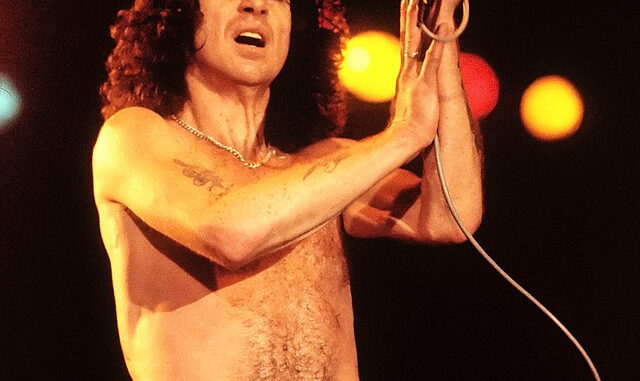
Bon Scott wasn’t just a frontman—he was a storm in denim and leather, a firebrand whose voice could slice through stadium noise like a thunderclap. Before his untimely death in 1980, Scott carved his name into the very DNA of rock music, leaving behind a legacy that AC/DC would build upon, but never quite replicate. His persona was raw and unapologetic, and in an era overflowing with rock stars, he stood out as something altogether wilder, more magnetic, and dangerously alive.
Born in Scotland and raised in Australia, Ronald Belford “Bon” Scott didn’t enter the world of music through a conventional path. He drifted through a series of jobs and bands, playing drums and doing vocals in groups that hinted at his potential but never quite harnessed it. That changed in 1974 when he joined a young, hard-charging band called AC/DC. With his arrival, the group transformed from a scrappy act into a juggernaut. His charisma and unfiltered energy fused perfectly with the gritty, riff-heavy sound that the Young brothers were crafting.
Scott brought with him a lyrical wit that few could match. His songs weren’t just rock anthems—they were stories, confessions, bar brawls turned into poetry. Tracks like “High Voltage,” “Whole Lotta Rosie,” and “Highway to Hell” weren’t just performances, they were lived-in, breathless declarations of life on the edge. His words gave AC/DC its swagger and its sneer, but also its soul. He didn’t just sing about chaos—he embodied it.
Live, Bon Scott was a revelation. Shirtless, grinning, and strutting across stages with a wild gleam in his eyes, he owned every moment. He was part frontman, part ringleader, part shaman. The connection he had with fans was primal—he didn’t perform at them, he pulled them into his world, where rules didn’t matter and everything was turned up to eleven. He made danger look like liberation.
But beneath the bravado and volume, there was vulnerability too. Scott’s lyrics hinted at a man deeply aware of his mortality and his own spiraling path. Songs like “Ride On” and “If You Want Blood (You’ve Got It)” aren’t just hard rock classics—they’re eerie foreshadowings, raw and introspective, showing a man caught in a whirlwind of fame, excess, and internal unrest. He wasn’t afraid to expose his darker side, which only made his voice hit harder.
By the time AC/DC released Highway to Hell in 1979, they were on the brink of superstardom. It was Scott’s last album, and arguably his finest moment. The title track became a rebellious anthem for a generation, its chorus echoing the spirit of a man who lived with no brakes. The album was tighter, more polished, and yet still pulsed with that wild, unpredictable fire that only Bon could summon. It was both a high point and a tragic omen.
On February 19, 1980, Bon Scott was found dead in a car in London, just months after Highway to Hell hit international success. The cause was acute alcohol poisoning, a brutal end to a life lived at full tilt. He was only 33. The shock reverberated around the world. It wasn’t just the loss of a singer—it felt like the flame of something truly untamable had been snuffed out too soon.
AC/DC, devastated, nearly disbanded. But with Bon’s spirit still hanging over them, they pressed on, recruiting Brian Johnson and releasing Back in Black—a towering tribute to their fallen brother. The album went on to become one of the best-selling records of all time, but even in its success, Scott’s absence was palpable. His fingerprints were on every note.
What makes Bon Scott unforgettable isn’t just the music, or the swagger, or even the tragic ending. It’s how real he was. He never played a character. He was the rare rock star who didn’t just talk about rebellion—he lived it, with every scar and every song bearing witness. In a genre full of manufactured personas, Bon was the genuine article.
He continues to inspire musicians and fans decades later. His voice, with its snarling grit and melodic bite, remains one of the most recognizable in rock history. Bands still cite him as the blueprint for what a rock frontman should be: fearless, raw, and undeniably human. His impact was so deep that even now, new generations discover his work and feel the electric jolt of his presence.
Bon Scott may have only been with AC/DC for a brief six years, but those years were enough to alter the course of rock forever. His voice was a battle cry for misfits and wild hearts, and his story a reminder that true legends don’t fade—they burn bright, burn fast, and leave behind something eternal.
In the pantheon of rock gods, Bon Scott holds a place all his own. Not because he aimed to be larger than life—but because he lived like it was the only way he knew how.

Leave a Reply